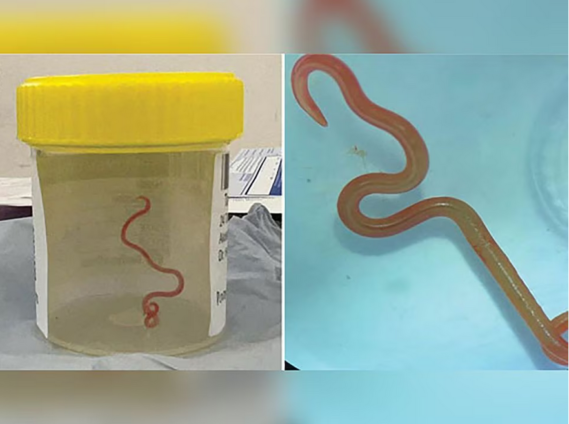An Australian scientist detailed on Tuesday a world-first discovery after an 8-cm (3-inch) -long parasitic worm was found in the brain of a woman in Canberra, spotlighting the risks of infectious organisms jumping between species.
Identified by scientists as a roundworm most commonly seen in carpet pythons, it was discovered last year in a 64-year-old undergoing surgery in the Australian capital, following complaints of abdominal pain, forgetfulness and depression.
A study of the case published on Monday in the journal Emerging Infectious Diseases suggested she may have been exposed through foraging for wild grasses that could have been contaminated with python faeces.
"When you operate on someone's brain and you take a biopsy of something, you never expect to encounter something living," Dr Sanjaya Senanayake, one of the study's authors, told Reuters.

While scientists are familiar with parasites in humans, a worm so large had never before been seen in a human, he added.
"(It) was certainly something we'll never forget."
The woman, whom Senanayake praised as being "very courageous" returned to normal life after her discharge from hospital, but is still being monitored by doctors.
"Because this was an unusual case at so many levels, we’re keeping a close eye on her and keeping in touch," Senanayake said.
The parasite species is known to scientists as Ophidascaris robertsi, the journal article said.
Reporting by Cordelia Hsu in Sydney; Writing by Alasdair Pal; Editing by Clarence Fernandez
Latest Stories
-
Titanic gold pocket watch sells for £900,000
36 mins -
Elon Musk in China to discuss enabling full self driving – reports
41 mins -
Foreign Affairs Ministry advises against travelling to Northern Mali
55 mins -
After dating him for three years, I proposed to my husband
58 mins -
Beatrice ‘Bee’ Arthur tackles plastic pollution through artistic exploration
2 hours -
Hundreds turn out for Luv FM/Telecel Fitness Walk in Kumasi
2 hours -
Ghana Post launches Asantehene Commemorative Stamp
2 hours -
Police fire tear gas to disperse Benin wage protest
2 hours -
Airline keeps mistaking 101-year-old woman for baby
2 hours -
Harvey Weinstein hospitalised after conviction overturned
2 hours -
Anis Hafar: Learning how to avoid wars
2 hours -
Private legal practitioner wins Akan NPP parliamentary candidate poll
2 hours -
American-Israeli hostage appears in Hamas video for first time
3 hours -
Samson’s Take: Arrogance of Power, Shameful Policing
9 hours -
Burnley score late to draw with Manchester United at Old Trafford
12 hours

